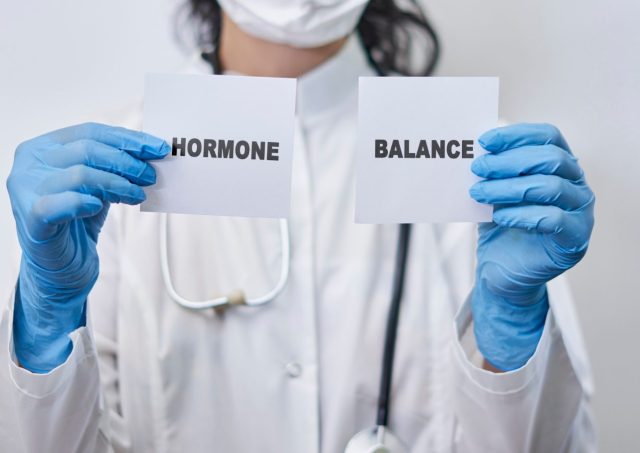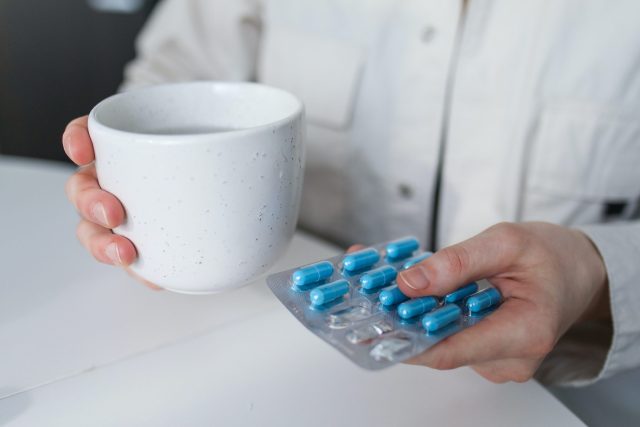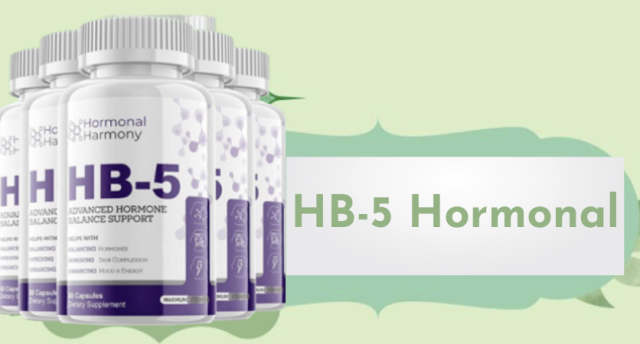3 Ways On How To Balance Hormones According To A Nutritionist: Complete Guide 2025
By Vanessa Richards
January 5, 2025 • Fact checked by Dumb Little Man

Hormonal imbalance is a term that we hear quite a lot. But what does this mean and why is it used to explain everything from acne to obesity and even depression?
In this article, we’ll break down what hormones are, how they can be unbalanced, and what you can do to fix this. Keep on reading!
How To Balance Hormones: What Are Hormones?
Most people have heard of hormones before and can probably mention a few common examples like insulin, adrenaline, testosterone, and estrogen. However, the human body contains well over 50 hormones, each of which has a distinct function (or in most cases several functions).
Hormones are simply regulatory chemical messengers produced naturally within the human body and carry out various actions in specific body tissues (known as target organs). These substances are produced and secreted by specialized tissues called glands, usually in response to some sort of external stimuli such as food, fear, hunger, and so on.
Many hormones are as well secreted independently from external stimuli and usually follow the body’s natural circadian rhythm.
Most of the common hormones we know are referred to as endocrine hormones, which means they reach their intended target organs by being secreted into the blood by endocrine glands. This includes popular hormones like insulin, estrogen, and so on.
There are also other types of hormones as well such as paracrine hormones (which are simply hormones that affect nearby tissues) and autocrine hormones (hormones that affect the gland that produced them).
As we said, there are numerous hormones and they play a key role in virtually every action within the human body. However, these hormones do not stay at a constant level throughout our lives (or in fact throughout the day).
They usually fluctuate throughout our lives in response to many normal and abnormal changes.
What Is Hormonal Imbalance?

As we mentioned earlier, hormones have many regulatory functions within the body. They maintain a delicate balance by either increasing or decreasing their secretion (for example thyroid hormones) or by acting through several hormones which have opposing actions (for example insulin and glucagon).
Therefore, when an individual has too much or too little of a particular hormone or shifts the normal balance between two or more opposing hormones they are said to have a hormonal imbalance.
Important Hormones In the Human Body
Let’s take a look at some well-known hormones within the human body.
Insulin
This is probably one of the most important hormones in the body and is one of the key hormones in charge of maintaining blood sugar levels and helping the body store nutrients. Insulin is produced in the pancreas which is located in the abdomen.
Estrogens
This is a general term for a related group of sex hormones that are found in both sexes but are produced in much higher quantities in females. They are vital for the development of the female external sexual characteristics as well as the internal sexual organs and regulating the menstrual cycle.
Most of the estrogen in females is produced in the ovaries, while both sexes produce little amounts in their adrenal glands and fat cells.
Progestogens
This is another class of hormones that are very important in females. The most well-known member is progesterone and they are in charge of regulating the menstrual cycle along with estrogens and also helps maintain the early stages of pregnancy.
They are mainly produced in the ovaries as well.
Androgens
Though androgens are usually referred to as male sex hormones they are produced in both sexes. However, they are produced in much higher quantities in men and are responsible for the development of various male sexual characteristics.
The most popular member of this class is testosterone, which is produced primarily in the testes.
Thyroid Hormones
Thyroid hormones are a class of hormones produced in the thyroid gland which are mainly responsible for controlling the body’s metabolism. Too much thyroid hormone can make you feel jittery and anxious constantly, while too little may lead to lethargy and chronic tiredness, as well as memory loss.
Cortisol
Cortisol is commonly known as the stress hormone because it is produced by the body during stressful situations. These may range from exams to dangerous situations and even stage fright.
However, this is just one of its many functions. Cortisol has to do with blood sugar control, metabolism, blood pressure maintenance, and so on.
Most cortisol within the body is produced by the adrenal glands located just on top of the kidneys.
Growth Hormone
Just as the name applies, this hormone is very important for supporting healthy growth, especially in children. In adults, it is mainly associated with regulating metabolism.
Growth hormone is secreted by the pituitary gland, which is located at the base of the brain.
Leptin and Ghrelin
These two hormones may not be some of the most well-known items on the list, but they are important in regulating metabolism, especially when it comes to appetite. Leptin is produced by fat cells and suppresses appetite, while ghrelin is secreted in the stomach and stimulates appetite.
Melatonin
For anybody who has dealt with insomnia in the past, this is probably a familiar name. Melatonin is a hormone produced by the pineal gland (which is found deep within the brain) and plays a crucial role in regulating our sleep-wake cycle.
Adrenaline
Known as the fight-or-flight hormone, adrenaline is usually produced when we are exposed to extremely stressful or potentially dangerous situations. It makes our hearts beat faster, lungs work more efficiently, and our muscles more active.
While this is great in the short term if secreted in excess or over a long period it can become quite unhealthy. Adrenaline is secreted primarily from the adrenal glands.
Symptoms of Hormone Imbalance

First of all, it’s important to remember that various hormones play a wide range of roles within our bodies. Therefore, the features of poor hormonal health can vary widely depending on the particular hormone(s) affected, to what degree they are affected, and other more person-specific factors such as age, sex, health status, and so on.
With that being said, there is considerable overlap in the symptoms of poor hormone health. Some of the signs are quite non-specific and could be due to other causes which have nothing to do with your endocrine system or hormone production.
Let’s take a look at some of these features.
Common Symptoms of Hormonal Imbalance
- Acne
- Mood swings
- Headaches
- Difficulty concentrating
- Weight changes (weight gain and weight loss)
- A hump of fat between your shoulders
- Chronic
- Muscle weakness
- Muscle aches, tenderness, and stiffness
- Joint pain, stiffness, or swelling
- Increased or decreased heart rate
- Excessive sweating, especially during the night
- Increased sensitivity to cold or heat
- Constipation or more frequent bowel movements
- Frequent urination
- Increased thirst
- Increased hunger
- Low libido
- Depression
- Nervousness, anxiety, or irritability
- Blurred vision
- Infertility
- Dry skin
- A puffy face
- Purple or pink stretch marks
- Hyperpigmentation
Symptoms of Hormonal Imbalance that are More Common in Females
- Heavy or irregular periods
- Hirsutism, or excessive body hair
- Vaginal dryness
- Pain during sex
- Breast tenderness
- Loss of bone mass (osteoporosis)
- Hot flashes
Symptoms of Hormonal Imbalance that are More Common in Males
- Gynecomastia, or the development of breast tissue
- Erectile dysfunction (ED)
- Decrease in beard growth and body hair growth
- Loss of muscle mass
Causes of Hormonal Imbalance
There are numerous hormones in the body, which are secreted by several different glands. Therefore, there are dozens of conditions and factors which can lead to hormonal imbalances. However, let’s take a look at some of the more common causes.
Pregnancy, breastfeeding, menopause, and during the menstrual cycle

During these periods the female body undergoes significant changes, especially when it comes to hormonal balance.
Some of these changes may be relatively short-term (such as the monthly menstrual cycle) or happen over months and even years (such as pregnancy and menopause). This also explains why hormonal imbalance is more common in females than males.
Puberty
This is a period of significant hormonal change and may cause symptoms of hormonal imbalance which may last from weeks to even years.
Medications
Certain medications and treatments have profound effects on our hormone levels. This includes things like birth control pills, hormone replacement therapy, steroids, chemotherapy for various cancers, various sex-hormone blocking therapies, and so on.
Tumors
Certain benign or malignant tumors are known to produce various hormones or hormone-like substances which can have various effects on our bodies. This may include tumors of the endocrine glands such as the pituitary gland, thyroid, adrenals, ovaries, and testes.
Eating disorders
Conditions like anorexia nervosa, bulimia nervosa, and binge-eating disorder can significantly affect hormone health and metabolism, leading to further issues.
Chronic stress

While encountering stressful situations is a normal part of life, long-term exposure to high levels of stress can negatively affect your health and hormones in various ways.
Such levels of stress increase your risk of obesity, Alzheimer’s disease, depression, diabetes, heart disease, and much more.
Thyroid diseases
Thyroid diseases are a common cause of hormonal imbalance and are unfortunately quite common in females. This may be due to an overactive or underactive thyroid gland.
Injury
Trauma to the brain or any other gland could lead to a range of hormonal issues.
Diabetes (type 1 and 2)
Diabetes is mostly known for its connection with insulin sensitivity and its effect on blood sugar.
However, it can also affect several other hormones as well.
Hypogonadism
This refers to a range of medical conditions in which the gonads (ovaries and testes) are performing at suboptimal levels. This is important because these organs are the primary source of sex hormones.
Polycystic Ovarian Syndrome (PCOS)
PCOS is a common endocrine condition that affects females and may manifest as multiple cysts in the ovaries, hormonal imbalances, and infertility.
Others
Several other relatively common medical conditions may also affect hormonal balance such as Cushing syndrome, congenital adrenal hyperplasia, Addison’s disease, primary ovarian insufficiency, and so on.
3 Ways To Balance Your Hormones
Hormonal imbalances can lead to a range of symptoms ranging from mildly inconveniencing to very distressing and even potentially life-threatening. However, luckily there are several ways you can balance your hormones using natural methods, medications, and supplements.
1. Natural Remedies for Hormonal Imbalance
Here are some natural remedies which can help you deal with hormonal imbalance.

Maintain a healthy weight
Unsurprisingly, unhealthy weight levels (whether overweight or underweight) have been linked to a wide range of hormonal issues. Maintaining a healthy weight through either weight loss or healthy weight gain can go a long way in improving your hormone balance.
Get enough sleep
Poor sleep patterns disrupt the body’s natural circadian rhythm and the secretion of various hormones.
Follow a healthy diet
A balanced diet is very important for anyone struggling with hormone imbalance. This especially includes eating enough protein (because most hormones are proteins), lowering your processed sugar intake, consuming meals that are high in dietary fiber, and eating a lot of healthy fats with sufficient amounts of omega-3 fatty acids.
Exercise regularly
There is strong evidence that regular exercise and healthy levels of physical activity are great ways of maintaining a normal hormone balance, as well as promoting better physical and mental health.
Avoid triggers
Some individuals may notice that their symptoms are triggered by certain foods, drugs, or activities. It’s important to identify these triggers and find sustainable solutions to help you avoid them.
Stress reduction techniques
Stress has been linked to hormonal imbalance both as a direct cause and as an aggravating factor. Practicing stress reduction techniques like yoga, meditation, breathing exercises, hobbies, and so on are great ways to maintain healthy levels of stress.
Remove unwanted hair
Individuals who are dealing with hirsutism may choose various methods of removing them through shaving, plucking, using depilatory creams, waxing, or laser hair removal treatments.
Reduce your alcohol consumption
Consuming excessive amounts of alcohol has been found to affect a wide range of hormones. Maintaining healthy drinking levels is advisable for anyone dealing with hormonal imbalance.
Avoid endocrine disruptors
Endocrine disruptors are substances found in our environment which adversely affect normal endocrine function. They may be natural or artificial compounds.
Some common examples include PCBs, DDT, bisphenol A, dioxins, and so on.
Decrease vaginal discomfort
Vaginal dryness and discomfort can be reduced with lubricants.
2. Medications for Hormonal Imbalance

The medications given for hormonal imbalance depend on the affected hormone, as well as other key factors. However, here are some popular medical treatments for common hormonal issues.
Estrogen therapy
This involves supporting the natural estrogens in the body with artificial estrogens. It is commonly done during menopause, in premature ovarian failure, and certain cases of female hypogonadism.
Vaginal estrogen
These are estrogen formulations that can be applied directly to the vagina to help with vaginal dryness and discomfort.
Hormonal birth control pills
Hormonal birth control pills help with some of the symptoms of hormonal imbalance like menstrual irregularities, acne, hirsutism, premenstrual syndrome, and so on.
Anti-androgen medications
These medications block the effect of various androgen hormones and are useful when these hormones are being produced in excessive amounts.
Testosterone therapy
This involves supporting the natural testosterone in the body with artificial testosterone. It is commonly done in older males dealing with issues like loss of muscle mass, low libido, osteoporosis, and so on.
Thyroid hormone therapy
This may involve suppressing an overactive thyroid gland or supporting the function of an underactive thyroid.
Metformin
This is a popular drug used for diabetes that is helpful in females dealing with PCOS as well.
Flibanserin (Addyi) and bremelanotide (Vyleesi)
These drugs are helpful in premenopausal women dealing with low libido (hypoactive sexual desire disorder).
3. Supplements for Hormonal Imbalance
Few supplements which are great for hormonal imbalance include B vitamins and Liver-enhancing supplements like turmeric, vitamin C, and alpha-lipoic acid. Also, Omega- 3 fatty acids, Vitamin D3 and Zinc are also helpful.
Herbal supplements like Nigella seeds, Ashwagandha, Black Cohosh root, Chasteberry, Milk Thistle, and Raspberry leaf are known to be good in balancing hormones too.
These supplements prove to be helpful too:
Best Source of Magnesium: Magnesium Breakthrough

Magnesium is greatly recommended for hormonal imbalances. It is important in the production of hormones.
This supplement is easily absorbed and travels through the digestive tract. As a result, you will experience ultimately zero tension and stress in your body.
Shop Magnesium Breakthrough at the Official Website.
Full Article: Magnesium Breakthrough Reviews: Does it Really Work?
Best-Selling All-Natural Hormone Balancing Supplement: Hormonal Harmony HB-5

An effective supplement produced by Hormonal Harmony is made from a blend of natural ingredients which work by regulating five important natural hormones – thyroid hormones, cortisol, insulin, leptin, and estrogen.
Shop HB-5 Hormonal at the Official Website.
Full Article: Hormonal Harmony Reviews: Does it Really Work?
Editor's Pick: Hormonal Harmony’s HB-5 Supplement
HB-5 is an amazing supplement created by the Hormonal Harmony brand and was developed by Dr. Eric J. Wood. It is a blend of several natural and effective ingredients which help regulate the levels of five important hormones within the body – thyroid hormones, cortisol, insulin, leptin, and estrogen.
The product is safe, FDA-approved, contains no GMOs, and can be used for both men and women. The ingredients used in the product include:
- Cinnamon Extract
- Ripe African Mango Extract
- Rhodiola Rosea
- Red Ginseng
- Kelp
- Zinc
- Copper
- Magnesium
- Selenium
- Bladderwrack
- Vitamin B12
- Diindolylmethane (DIM)
These effective ingredients are guaranteed to help you with any symptoms you’re dealing with. The product also offers a 60-day 100% money-back guarantee if you are not satisfied with the product.
Note that HB-5 is not intended for individuals under the age of 18. Women who are pregnant or breastfeeding should discuss this with their physician before taking this product. Also, avoid taking this supplement if you have an allergy to any of the ingredients.
Click here to get HB-5 Hormonal at a Discounted Price.
Final Words
Our hormone levels change constantly throughout our lives. However, sometimes this change may lead to several serious issues such as hormonal imbalance.
There are various ways of dealing with hormonal imbalances. These include things like lifestyle modification, weight loss, eating a healthy diet, medications, and supplements.
The HB-5 by Hormonal Harmony is a great supplement for dealing with hormonal imbalances. It is quite effective and works on five major hormones found within the body.
It contains a blend of natural ingredients which are safe, GMO-free, and can be used by men and women. Try this amazing product if you are dealing with symptoms of hormone imbalance.
Click here to get HB-5 Hormonal at a Discounted Price.
>>Related Article: Understanding Hormonal Imbalance: A Complete Guide 2025
How To Balance Hormones FAQs
How do you diagnose hormone imbalance?
Hormone imbalance can be diagnosed by an endocrinologist (a doctor who specializes in diseases of the endocrine glands) by taking into account your symptoms and using various tests which may involve the blood, saliva, or urine.
How do you treat hormone imbalance?
There are various ways of treating hormonal imbalances. These include lifestyle modifications, weight loss, medications, supplements, and much more.
Why are hormone imbalances more common in females?
This is because females go through several major stages of hormonal change during their life – puberty, pregnancy, breastfeeding, and menopause.
Vanessa Richards
Vanessa is a mom of 3 lovely children and a software geek. Outside of her career as a health and wellness instructor. She enjoys writing and researching on topics such as finance, software, health and culinary.



